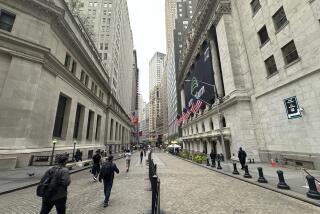Stocks rise as oil prices fall sharply
NEW YORK — Stocks ended a back-and-forth session with modest advances Thursday as a sharp drop in oil prices helped counter renewed concerns about the strength of the economy.
Crude futures fell nearly $5 a barrel after China, in a move that could reduce its demand for oil, announced plans to raise domestic caps on gasoline and diesel fuel prices. The pullback in oil was welcome after weeks of rising prices and growing fears that businesses and consumers could be forced to curb spending.
Citigroup, meanwhile, had a negative influence on the market, warning that it would record substantial second-quarter write-downs of bad debt.
“It really seems to be a tug-of-war between the good news and the bad news, or the not-as-bad news and the terrible news,” said Jennifer Ellison, principal with wealth management firm Bingham, Osborn & Scarborough in San Francisco.
The Dow rose 34.03 points, or 0.3%, to close at 12,063.09 after briefly falling below the 12,000 mark for the second consecutive day.
The Standard & Poor’s 500 index rose 5.02 points, or 0.4%, to 1,342.83. Among the 10 broad industry groups in the S&P; 500, only energy stocks fell.
The Nasdaq composite index jumped 32.35 points, or 1.3%, to 2,462.06. The Russell 2,000 index of smaller companies gained 7.12 points, or 1%, to 737.83.
The numbers of advancing and declining issues were about equal on the New York Stock Exchange.
Crude oil futures fell $4.75 to settle at $131.93 a barrel on the New York Mercantile Exchange after China disclosed plans to raise prices for gasoline and diesel fuel by 16% and 18%, respectively.
Government bond yields rose along with stocks. The yield on the benchmark 10-year Treasury note climbed to 4.21% from 4.14% late Wednesday.
The dollar traded mixed against other major currencies, while gold prices rose.
Mixed economic reports didn’t point investors in a clear direction. The Federal Reserve Bank of Philadelphia issued a regional manufacturing report depicting slumping demand and rising prices. And the Conference Board, a private business group, said its forecast of future economic activity ticked higher by 0.1% in May.
The Labor Department reported that the number of initial unemployment claims declined by 5,000 last week from the previous week. The decrease was a bit smaller than expected, and the four-week moving average of initial claims, a less volatile indicator, rose -- a sign that the U.S. job market remains strained.
Alfred Goldman, chief market strategist at Wachovia Securities in St. Louis, said the economic news wasn’t wholly unexpected and that mixed reports were likely to continue and unnerve some investors.
“We think the market is in a period of transition,” Goldman said. “In such an environment confidence is often very thin.”
Citigroup fell 23 cents to $20.17 on Thursday after the company’s comments about the likelihood of further write-offs of bad debt.
The remarks appeared at times to weigh on the financial sector overall. But an index of financial stocks in the S&P; 500 rebounded 0.9% for the day after sharp declines Tuesday and Wednesday.
Among other market highlights:
* Apria Healthcare Group surged $4.18, or 26%, to $20. Blackstone Group offered to take the Lake Forest-based home healthcare company private for $21 a share, or $922 million, in cash.
* J.M. Smucker tumbled $4.39, or 8.8%, to $45.55. High raw material costs weighed down profit and helped offset a 20% rise in sales for the jam and jelly maker.
* Pier 1 Imports plunged $1.23, or 20%, to $5.01 after posting a bigger-than-expected loss for the its latest quarter.
* Boeing jumped $2.30, or 3.1%, to $76.95 after a government audit agency recommended late Wednesday that the Air Force reopen bidding for a $35-billion contract that went to the company’s rivals.
* Shares of Sirius Satellite Radio and XM Satellite Radio Holdings, which have agreed to merge, sank after a Goldman Sachs analyst predicted softening demand for satellite radio. Sirius fell 30 cents, or 12%, to $2.13. XM lost $1.77, or 17%, to $8.61.
* Overseas, key stock indexes fell 2.2% in Japan, 0.8% in Britain, 0.1% in Germany and 0.6% in France.
More to Read
Inside the business of entertainment
The Wide Shot brings you news, analysis and insights on everything from streaming wars to production — and what it all means for the future.
You may occasionally receive promotional content from the Los Angeles Times.










